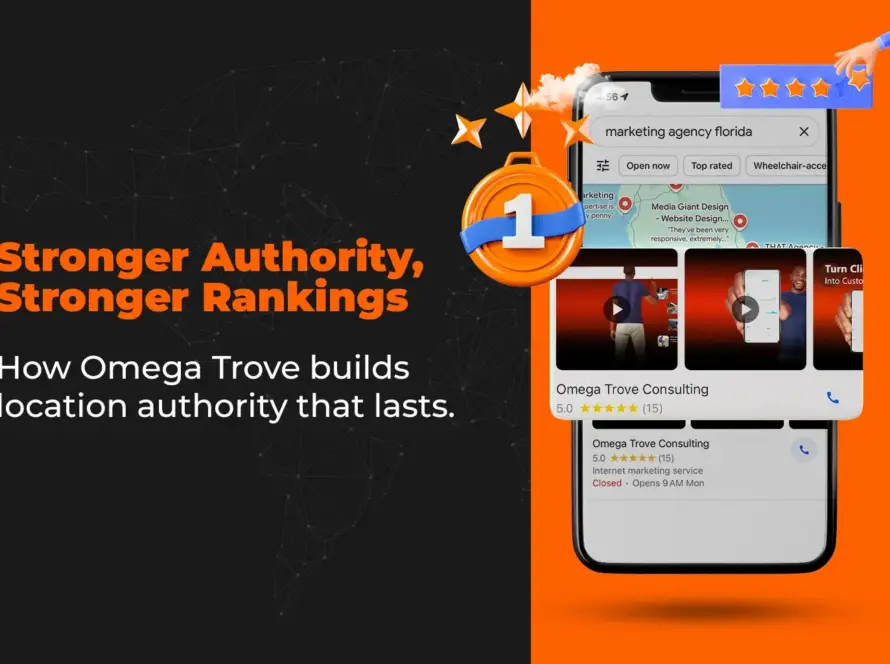What Is a Meta Title in SEO?
A Meta Title, also known as a title tag, is an HTML element that specifies the title of a web page. It appears in search engine results and browser tabs. Meta titles are one of the strongest on-page SEO signals. At Omega Trove, we write optimized titles that improve rankings, drive clicks, and communicate clarity.
What Does a Meta Title Mean in Search Engine Optimization?
In SEO, meta titles act as both ranking signals and user prompts. For example:
- “SEO Services for Small Businesses | Omega Trove” — keyword-rich and brand-aligned.
- “Home” — vague, generic, and less effective.
Consultants use meta titles to help search engines understand page topics while encouraging higher CTRs from searchers.
Why Meta Titles Matter for Business Strategy
Meta titles influence both search visibility and user behavior.
Benefits of Meta Titles:
- Strong ranking signal for target keywords
- Improve CTRs by making results more compelling
- Communicate brand and value proposition in search results
- Differentiate from competitors in crowded SERPs
- Strengthen branding when consistently formatted
How Omega Trove Optimizes Meta Titles
Omega Trove applies clarity, keyword research, and brand consistency to title writing:
- Integrating primary keywords naturally into titles
- Keeping titles within 50–60 characters for best display
- Using brand mentions to build recognition
- Writing unique titles for every page to avoid cannibalization
- Testing variations for CTR improvements in Search Console
Learn more about our SEO services.
Related Terms You Should Know
- Meta Description – Complements the meta title in search results.
- On-Page SEO – Meta titles are a core on-page element.
- Search Intent – Titles should match user search behavior.
Frequently Asked Questions
What is a meta title in SEO?
A meta title is an HTML tag that defines the title of a web page. It appears in browser tabs and as the clickable headline in search engine results. Meta titles tell both users and search engines what the page is about—making them critical for SEO visibility and click-through rates.
Why are meta titles important?
Meta titles are one of the strongest on-page SEO elements. They influence search engine rankings and user behavior. A well-written title can boost your visibility and encourage more users to click your listing over competitors.
How long should a meta title be?
Meta titles should be between 50 and 60 characters. If they’re too long, Google may truncate them in the search results. Keeping them concise ensures the full message is visible to users.
Can multiple pages have the same meta title?
No. Using duplicate meta titles across multiple pages confuses search engines and dilutes relevance. Each page should have a unique, keyword-optimized title that reflects its specific content.
Should I include my brand in the meta title?
Yes. Adding your brand name to titles—especially on key pages like your homepage or service pages—builds recognition and trust. A consistent format like “Service | Brand Name” is often ideal.
Where should keywords go in a meta title?
Place primary keywords near the beginning of your meta title. Search engines give more weight to early-positioned words, and users scan the start of titles first when browsing results.
What tools can I use to write better meta titles?
Popular SEO tools for meta title optimization include:
- Yoast SEO and Rank Math (WordPress plugins)
- Ahrefs and SEMrush (for competitive analysis)
- Google Search Console (to test click-through rate performance)
These help track title length, keyword placement, and engagement metrics.
Can meta titles alone improve SEO rankings?
Not by themselves. While meta titles are powerful, they work best in combination with quality content, internal linking, and backlinks. Think of meta titles as the “front door” to a fully optimized page.
What are signs of a poorly written meta title?
- Too short or too long (outside 50–60 characters)
- Lacking relevant keywords
- Generic or vague (e.g., “Home” or “Welcome”)
- Overstuffed with keywords
- Doesn’t reflect the page content accurately
Avoid these mistakes to prevent lower rankings and poor click-through rates.
What’s an example of a good meta title?
Here’s a strong example:
“Local SEO Services for Dentists | Free Site Audit”
This title is keyword-rich, compelling, and communicates both the service and a value proposition. It stays within the character limit and appeals to both humans and search algorithms.


